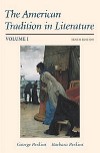After the publication of his essay, "Nature," Ralph Waldo Emerson became the unofficial head of New England transcendentalism. While the term has a variety of meanings, at its core, according to Orestes Bronson, a contemporary of the other Concord writers, is the inquiry into the nature of knowledge and the grounds for knowing anything. From that quest, all other issues and concerns derive: the nature of the individual, society, Nature, and to the universe-at-large. Questions of responsibility, the stewardship of resources, the authority of religion(s), the ethics of expediency and political compromise, and the virtues of human social and political institutions--all are generated, consequentially, from the answers to questions about the nature of knowledge and the nature of the grammar of truth that confirms it. Spirituality, individualism, Nature, and social responsibility also figure as dominant themes and issues in the work of the American Transcendentalists, who often took their cues from European and British counterparts like Victor Cousins and Thomas Carlyle who communicated regularly with their American colleagues. |



 2003 McGraw-Hill Higher Education
2003 McGraw-Hill Higher Education